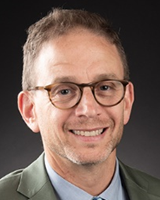ICR Institute Advisory Board Members – Biographies

Hanne Ostergaard (Chair)
Professor, Department of Medical Microbiology & Immunology, University of Alberta
Director, Cancer Research Institute of Northern Alberta, University of Alberta
Dr. Ostergaard completed both her B.Sc. in Cellular and Molecular Biology and PhD in Immunology at the University of California, Los Angeles (UCLA). Following completion of her PhD she undertook postdoctoral studies at The Salk Institute during which time she was supported by a Damon-Runyon Walter Winchell Cancer Research Fund Fellowship and then a Leukemia Society of America Fellowship. She then moved to the University of Alberta as an Assistant Professor and is currently a Professor in the Department of Medical Microbiology & Immunology. She was director for seven years of the Immunology Network, and Associate Dean, Research (Graduate Programs) for the Faculty of Medicine and Dentistry from 2012-2020. She has served on numerous peer review committees locally, nationally and internationally and was a member of the Advisory Council on Research for the Canadian Cancer Society for eight years. She was the President of the Canadian Society for Immunology and organized a number of its annual meetings. She has been an Associate Editor of the Journal of Immunology and served on the Editorial Board for the Journal of Biological Chemistry. She is currently the Director of the Cancer Research Institute of Northern Alberta at the University of Alberta. Her research centers on cytotoxic T lymphocytes of the immune system and how they recognize and kill cancer cells. She is focused on mechanistic studies that examine the cell biology of how these cytotoxic cells migrate and function and how different populations of CD8 T cells suppress tumor grown.

Jason Berman
CEO and Scientific Director of the CHEO Research Institute and the Vice President Research at CHEO
Professor, Department of Pediatrics, Department of Cellular and Molecular Medicine, University of Ottawa
Jason Berman completed a clinical fellowship in Pediatric Hematology/Oncology at Boston Children’s Hospital and post-doctoral training at the Dana-Farber Cancer Institute funded by the prestigious Pediatric Scientist Development Program. He was recruited to Dalhousie University and the IWK Health Centre in 2005 as the named MSC Clinician-Scientist in Pediatric Oncology. He became Professor of Pediatrics, Microbiology & Immunology and Pathology at Dalhousie University and Associate Chair Research for the Department of Pediatrics. He was awarded the Peggy Davison Clinician Scientist Award and Excellence in Innovation Award by CancerCare Nova Scotia. In 2017, he assumed the role of interim Vice President Research at the IWK Health Centre. He relocated to Ottawa in 2019 to assume the role of CEO and Scientific Director of the CHEO Research Institute and Vice President Research at CHEO. He is a full professor in the Departments of Pediatrics and Cellular and Molecular Medicine at the University of Ottawa. Dr. Berman is internationally recognized for pioneering research using the zebrafish to study childhood cancers, cancer predisposition syndromes and rare inherited diseases. He has been a member of the Children’s Oncology Group Myeloid Committee since 2008 and is co-chair of an international trial of risk-stratified therapy in Down syndrome myeloid leukemia. He is former co-chair of the C17 Canadian Childhood Cancer Network Developmental Therapeutics Committee. He is outgoing President of the Canadian Society of Clinical Investigation and incoming President of the Canadian Hematology Society. He serves on the Board of Directors of the Ontario Institute for Cancer Research.

Parveen Bhatti
Principal Investigator, Cancer Epidemiology & Prevention, Cancer Control Research, BC Cancer
Adjunct Professor, School of Population and Public Health, Faculty of Medicine, University of British Columbia
Dr. Parveen Bhatti is an epidemiologist at BC Cancer and serves as Scientific Director of the British Columbia Generations Project, one of the population-based cohort studies contributing to the Canadian Partnership for Tomorrow’s Health. After graduating with a B.Sc. in Cell Biology and Genetics (1998) and M.Sc. in Occupational and Environmental Hygiene (2000), both from the University of British Columbia, Dr. Bhatti completed a PhD in Environmental Epidemiology at the University of Washington (2006). He went on to pursue post-doctoral work in molecular epidemiology with the Division of Cancer Epidemiology and Genetics at the U.S. National Cancer Institute. In 2009, Dr. Bhatti became a faculty member in the Division of Public Health Sciences at the Fred Hutchinson Cancer Research Center and the School of Public Health at the University of Washington. In 2018, he joined BC Cancer where his research continues to focus on the use of molecular markers to improve understanding of cancer risk factors as a means to identify potential targets for intervention or biomarkers for early cancer diagnosis. His research interests include pharmacoepidemiology, impacts of early childhood exposures to environmental pollutants, and epigenetic and metabolomic mediators of cancer risk. Dr. Bhatti’s research in nightshift work and cancer, in particular, is broadly recognized. In 2019, he served on the International Agency for Research on Cancer Monograph Committee that reviewed evidence for carcinogenicity of nightshift work.

Louise Bird
Patient, Family Partner
Louise Bird live in Carlyle, Saskatchewan, Treaty 4 Area. As a wife, mother, nana, caregiver, breast cancer survivor, and patient family partner, she answers to many titles. Being a Breast Cancer Survivor is what led me to sharing my voice as a patient family partner. She has been a patient family partner since 2008. I have shared my experience (and still do) on both provincial and pan-Canadian initiatives. My background is in healthcare and education. Being a patient family partner, you spend a lot of time “listening and learning” so you can be the voice of representation! “You want the journey to be better/improved for the next person undertaking it!”

Juliet Daniel
Cancer Biologist, Faculty of Science, McMaster University
Associate Dean of Research and External Relations, Faculty of Science, McMaster University
Professor Juliet Daniel is a Cancer Biologist and the Associate Dean of Research and External Relations in the Faculty of Science at McMaster University. She received her BSc from Queen’s University, her PhD from UBC, and completed Postdoctoral studies at St Jude Children’s Research Hospital and Vanderbilt University in Tennessee. Prof. Daniel’s research is focused on elucidating the role of the transcription factor Kaiso in cancer and vertebrate development. Her team is also currently elucidating the molecular/genetic causes of the disparities in incidence and poor outcomes of triple negative breast cancer in Black women. In recognition of her research and community service, Prof. Daniel has received several awards including the inaugural Canadian Cancer Society Inclusive Excellence Award, an Honorary Doctor of Science from the University of the West Indies (UWI) Cave Hill, a UWI Vice Chancellor’s Award, and a WXN Canada’s Most Powerful Women: Top 100 Award among many others.

Satish Gopal, MD, MPH
Director, Centre for Global Health, National Cancer Institute
Dr. Gopal earned his medical degree from the Duke University School of Medicine in 2001. He completed training in internal medicine and pediatrics at the University of Michigan, and training in oncology and infectious disease training at the University of North Carolina. He was appointed Director of the Center for Global Health at the National Cancer Institute (NCI) in 2020. In this role, he oversees the development of initiatives and collaborations with other NCI and NIH partners, NCI-designated cancer centers, and other governmental and non-governmental organizations to support cancer research, promote science-based cancer control, and build research capacity in low- and middle-income countries. Before coming to NCI, Dr. Gopal was the Cancer Program Director for the University of North Carolina collaboration with the Malawi Ministry of Health.
As physician-scientist, his NIH-funded research program focused on epidemiologic, clinical, and translational studies of lymphoma and HIV-associated malignancies in Africa. He has authored more than 130 publications and mentored more than 30 early-career U.S. and African pre- and post-doctoral cancer researchers. As an adjunct investigator at the NCI, he continues clinical and translational research related to lymphoid malignancies in Africa. He previously served as the Associate Chair for African International Sites for the NCI AIDS Malignancy Consortium with oversight responsibility for the network’s African clinical trials. He currently serves as the US representative on the Scientific Council for the International Agency for Research on Cancer and as an Ex Officio Advisory Board Member for the NIH Fogarty International Center. He is also a recipient of the 2024 American Society of Clinical Oncology Humanitarian Award.

Bishal Gyawali, MD, PhD
Associate Professor, Medical Oncology, Queen’s University
Scientist, Division of Cancer Care and Epidemiology, Queen’s University
Bishal Gyawali, MD, PhD is a medical oncologist and an associate professor in medical oncology and public health sciences and scientist in the Division of Cancer Care and Epidemiology, in Queen’s University, Kingston, Canada. His clinical expertise is across multiple adult solid tumors, with special focus on GI, GU and breast malignancies. He is in the editorial and advisory board for multiple medicine and oncology journals and has authored or co-authored nearly 200 peer-reviewed articles in high-impact journals. Dr. Gyawali’ s areas of academic interests include cancer policy, evidence-based oncology, financial toxicities of cancer treatment, clinical trial methods, supportive care, cancer care disparities, and global oncology. He introduced the term “cancer groundshot” advocating for investments in implementation of proven interventions for global cancer control. His interviews and studies have been reported in several influential media such as CNN, NPR, Washington Post, STAT News etc. He is an expert for the WHO Drug Advisory Panel. He is a member of the WHO Essential Medicines List Committee for cancer drugs; ESMO-MCBS, ESMO Communications, and ESMO Public Policy committees, and ASCO-Health Equity and Outcomes Committee. He is the co-founder of the “Common Sense Oncology” movement.

Bertrand J. Jean-Claude
Professor of Medicine, McGill University Health Centre,
Director, CTB Drug Discovery Platform
Associate Leader, Metabolic Disorder & Complication Program
Director, Drug Development Training Program
Director, Cancer Drug Research Laboratory
Chief Coordinator, Graduate Diploma in Clinical Research
The Research Institute of the McGill University Health Centre
Department of Medicine, McGill University
Bertrand J. Jean-Claude, PhD is Director of the CTB Drug Discovery Platform at the Research Institute of the McGill University Health Centre (RI-MUHC) and Associate Leader of the Metabolic Disease and Complications Program (MeDiC). An Associate Professor of Medicine at McGill University, he has received many awards, including the Medical Research Council of Canada (MRC)- Cancer Research Society (CRS) partnered award, the US Department of Defence New Investigator Award and the Fonds de recherche du Québec Santé (FRQS) Senior Investigator Award. His research program focuses on a novel tumour targeting approach initiated in his Cancer Drug Research Laboratory, termed “the Combi-Targeting concept.” This approach seeks to confer signaling inhibitory properties to potent DNA damaging agents with the purpose of interfering with mechanisms that lead to apoptosis. The first proof-of-concept synthesis of a novel molecule capable of targeting the epidermal growth factor receptor (EGFR) and damaging DNA made Dr. Jean-Claude a pioneer in the rational design of dual targeted kinase inhibitors. He is currently applying the new combi-targeting approach to immune-oncology. In addition to directing a research laboratory and a technological platform, Dr. Jean-Claude leads two major training programs at McGill University: the Graduate Diploma in Clinical Research and the Drug Development Training Program (DDTP).

Erika D. Penz, SM MD MSc FRCPC
Associate Professor of Medicine, Department of Medicine, Division of Respirology, Critical Care and Sleep Medicine, University of Saskatchewan
Program Director, Respirology Fellowship Training Program
Dr. Penz is Associate Professor of Medicine in the Department of Medicine, Division of Respirology, Critical Care and Sleep Medicine at the University of Saskatchewan and Program Director for the Respirology Fellowship Training Program. She is an adjunct scientist with the Saskatchewan Health Quality Council (HQC) and a member of the Respiratory Research Centre, University of Saskatchewan.
Dr. Penz completed her undergraduate degree at the University of Saskatchewan in 1996 and Master’s of Science in Health Policy and Management in 2001 at the Harvard School of Public Health. She went on to complete her medical degree from McMaster University in 2004 followed by Internal Medicine (2008) and Respiratory Fellowship training (2010) at the University of Calgary. She pursued a Master’s in Health Economics from the University of York, UK followed by a research fellowship in Health Economics in 2013. She took her first faculty appointment at the University of Saskatchewan in September 2013.
Her program of research relates to studying the burden of disease in society in order to understand 1) the personal impact chronic disease has on individuals in terms of quality of life, productivity, and mortality; 2) the health care system impact in terms of health service utilization, costs, budget and system capacity; and 3) how therapeutic interventions improve health system outcomes in a cost-effective way. She uses tools such as decision analytic models, cost-effectiveness analysis alongside clinical trials, and large administrative databases to study health outcomes at a population level. Given that respiratory diseases, including lung cancer, contribute greatly to morbidity and mortality in society, her research has focused largely on these diseases.

Trevor Pugh, PhD, FACMG
Director, Joint Genomic Program, University Health Network
Director, Ontario Institute for Cancer Research (OICR)
Associate Professor, Department of Medical Biophysics, University of Toronto
Senior Scientist, Princess Margaret Cancer Centre
Senior Investigator, Ontario Institute for Cancer Research
Dr. Trevor Pugh, PhD, FACMG is a cancer genomics researcher, board-certified molecular geneticist, and holder of the Canada Research Chair in Translational Genomics. He is Director of the Joint Genomics Program of the University Health Network and Ontario Institute for Cancer Research which delivers basic, translational, and clinically-accredited genomics services. He is also appointed as Associate Professor in the University of Toronto Department of Medical Biophysics, Senior Scientist at the Princess Margaret Cancer Centre, and Senior Investigator at the Ontario Institute for Cancer Research. His research lab is focused on understanding clinical implications of clonal shifts in cancer and non-cancerous cell populations during treatment, most recently using cell-free DNA, immune repertoire, and single cell RNA-seq sequencing. Most recently, he was recognized by Canada's Top 40 Under 40, the Canadian Cancer Society Bernard and Francine Dorval Prize, a Terry Fox New Investigator Award, and inclusion on the Web of Science Highly Cited Researchers List.

Srinivas Raman, MD, FRCPC
Radiation Oncology, BC Cancer Vancouver
Dr. Srinivas Raman previously completed mechanical engineering degrees and medical school at University of British Columbia, followed by radiation oncology residency at University of Toronto, and subsequently a fellowship at BC Cancer Vancouver. He is currently a radiation oncologist at BC Cancer Vancouver and a clinical associate professor in the division of radiation oncology, University of British Columbia. He serves as the lung tumor group chair at BC Cancer. He is dual certified in radiation oncology and clinical informatics - his research interests broadly include applications of artificial intelligence and automation in clinical workflows. He is involved in several projects related to automated radiotherapy planning, resource optimization, medical image analysis and clinical evaluation of physician and patient facing large language models.

Lee-Hwa Tai, PhD
CRMUS Chair in Translational Immunotherapy Research
Associate Professor / Professeure Agrégée, Université de Sherbrooke, Département d’Immunologie et de Biologie Cellulaire, Faculté de Médecine et des Sciences de la Santé
Dr. Lee-Hwa Tai is an Associate Professor in the Department of Immunology and Cell Biology at Université de Sherbrooke. Her research focuses on understanding the immune response to viro-immunotherapies and cancer vaccines. She obtained her PhD in Immunology at McGill University in the lab of Dr. Andrew Makrigiannis at the IRCM where she discovered MHC-I regulation of plasmacytoid dendritic cell function. Dr. Tai then joined Dr. Rebecca Auer’s lab as a postdoctoral fellow at the OHRI. Her work in the Auer lab aimed at understanding postoperative immunosuppression and developing novel virotherapies to fight colorectal cancer. Dr. Tai’s discoveries in the field of tumor immunology and viro-immunotherapy led her to win a prestigious Scholarship for the Next Generation of Scientists from the Cancer Research Society, which provided an operating grant to start her own lab. In 2016, Dr. Tai was recruited as an Assistant Professor in the Division of Immunology at the Université de Sherbrooke, and as a researcher at the CRCHUS. In that same year, she won a Junior 1 Researcher-Scholar award from FRQS and a New Investigator Award from CIHR – demonstrating her excellent research potential. Since then, Dr. Tai has obtained operating funds from NSERC, CIHR; equipment funds from JR Evans Leaders’ CFI; and a Université de Sherbrooke CRMUS Chair in Translational Immunotherapy Research.

Robin Urquhart
Associate Professor, Department of Community Health and Epidemiology/Department of Surgery and Division of Medical Education, Dalhousie University
Senior Scientist, Beatrice Hunter Cancer Research Institute
Affiliate Scientist, Nova Scotia Health
Nova Scotia Lead, Atlantic Cancer Consortium
Scientific Director, Atlantic Partnership for Tomorrow’s Health (Atlantic PATH)
Dr. Robin Urquhart is an Associate Professor and Canadian Cancer Society (Nova Scotia Division) Endowed Chair in Population Cancer Research in the Department of Community Health and Epidemiology, with cross-appointments in the Department of Surgery and Division of Medical Education at Dalhousie University. She is a Senior Scientist with the Beatrice Hunter Cancer Research Institute and an Affiliate Scientist at Nova Scotia Health. Dr. Urquhart is also the Nova Scotia Lead of the Atlantic Cancer Consortium and Scientific Director of the Atlantic Partnership for Tomorrow’s Health (Atlantic PATH). Dr. Urquhart is a health services researcher and implementation scientist. Spanning the entire cancer continuum, from primary prevention to survivorship and end-of-life care, her research examines issues related to access, quality, equity, and effectiveness in cancer care and control, and investigates ways to improve care delivery and resultant patient, family, population, and health system outcomes.

Alison Wallace, MD, PhD, FRCSC
Assistant Professor, Division of Thoracic Surgery, Dalhousie University
Director of Research, Division of Thoracic Surgery, Dalhousie University
Co-Director, QEII Lung Biobank
Dr. Alison Wallace MD, PHD, FRCSC is a thoracic surgeon with an interest in minimally invasive and robotic lung surgery. Dr. Wallace completed her General Surgery residency at the University of British Columbia and subsequently pursued a Thoracic Surgery fellowship at the University of Toronto. Furthermore, she holds a PhD and has undergone extensive scientific training, including a postdoctoral fellowship at Columbia University in New York. Currently, Dr. Wallace serves as an Assistant Professor within the Division of Thoracic Surgery, Department of Surgery, at Dalhousie University, a position she has held since 2019. Within her division, she assumes the role of Director of Research and also shares the responsibilities of Co-Director for the QEII Lung Biobank. In her capacity as a surgeon-scientist, Dr. Wallace focuses her research on unraveling the intricate molecular mechanisms through which various environmental exposures, including smoke and radon, contribute to the onset and progression of lung diseases such as cancer and COPD. Notably, Dr. Wallace holds two patents centered around the prevention and treatment of lung diseases, showcasing her innovative approach to addressing these health concerns.
- Date modified: